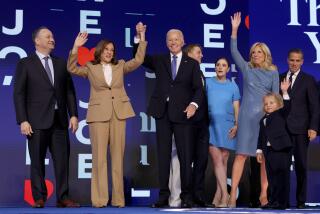State of the Black Union in L.A. addresses mixed emotions
- Share via
With an African American president in the White House during a tough recession, the 10th annual State of the Black Union convention organized by talk show host Tavis Smiley in Los Angeles on Saturday offered forums for both enthusiasm and worry about the future.
About 6,000 people attended the meeting at the Los Angeles Convention Center and heard prominent black political and cultural figures discuss African American issues in the era of Barack Obama. The topics included foreclosures, gang violence, education and U.S. diplomacy in Africa.
Smiley said the changes in Washington and the economic crisis provided “the most interesting background” for the gathering, which he started in 2000 in Los Angeles and staged in other cities in eight intervening years. “It’s a wonderful time to come together. There’s a lot of hope and energy in the air, but clearly this is a difficult time, too, the worst since the Great Depression,” the author and broadcast personality said.
Among the speakers were civil rights leaders and pastors Jesse Jackson Sr. and Al Sharpton, Rep. Maxine Waters (D-Los Angeles), writers Michael Eric Dyson and Cornel West, Republican National Committee Chairman Michael S. Steele, financial commentator Michelle Singletary and National Urban League President Marc Morial.
Dyson, a Georgetown University sociology professor who is an expert on hip-hop music, dismissed the notion that Obama’s election means that the United States is a post-racial society. Having a black president is a rebuke to white supremacists but racism continues, he said, citing “Third World conditions in post-industrial cities,” where many blacks live, and the Jan. 1 death in Oakland of Oscar Grant, a black man who was unarmed when allegedly shot in the back by a white transit officer. The officer has been charged with murder.
Besides, Dyson added in a humorous aside, a post-racial society would lose black icons. “You want to give up Stevie Wonder? That would make Stevie Wonder Frank Sinatra!”
Jackson urged the audience to pay close attention to whether federal anti-recession stimulus funds help community banks and small businesses in black neighborhoods, not just mega-sized financial conglomerates. “Will the money get down to the bottom?” he asked, from a platform that was decorated with symbols of the convention’s corporate sponsors, including Wells Fargo and ExxonMobil.
Most of the audience members were Democrats enthusiastic about Obama, who sent a videotaped greeting to the convention. Yet Steele, the first African American elected as GOP national chairman, said he did not think twice about presenting Republican concerns about deficits and jobs. “This is not a hostile engagement for me at all. This is a chance for me to share a different perspective that exists in the black community,” said Steele, a former lieutenant governor of Maryland.
Among the attendees was Daudi Blackwood, an actor from Hollywood, who wanted to focus on issues “that concern the black culture and how that relates to society.” He too said Obama’s election was a happy but also challenging moment. “It means now that there are no more excuses. If an African American man can become president, that kind of lets other people know that they don’t have limits now” in pursuing career and other goals, he said.
Miriam Quates-Jackson of West Los Angeles, who works in accounting, brought her 5-year-old son, Jonathan, to the convention. She wanted him “to experience the positiveness in the black community. That’s very important to me,” she said.
--
More to Read
Sign up for Essential California
The most important California stories and recommendations in your inbox every morning.
You may occasionally receive promotional content from the Los Angeles Times.














